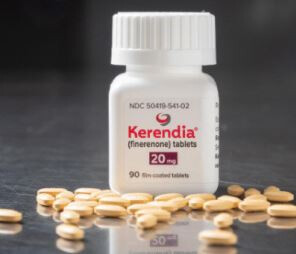
A recent study has shown that the kidney disease drug finerenone (Kerendia) may also be effective in reducing the risk of developing diabetes. This comes after previous findings suggested its potential as a treatment for heart failure.
Finerenone, a non-steroidal mineralocorticoid receptor antagonist (NS-MRA), is typically used to slow the progression of kidney and cardiovascular disease in patients with chronic kidney disease (CKD) and type 2 diabetes.
Following its success in the FIDELIO-DKD study in reducing the risk of diabetic kidney disease progression and cardiovascular events, and the FIGARO-DKD study in demonstrating cardiovascular protection in heart failure patients, researchers have now explored its potential in diabetes prevention.
Researchers, led by Zawad H. Butt of the British Heart Foundation Cardiovascular Research Centre, hypothesized that finerenone, a non-steroidal MRA, could also affect blood sugar levels, given the association between steroid MRAs like spironolactone and increased HbA1c levels.
The study involved 6,001 heart failure patients (NYHA class II-IV, left ventricular ejection fraction ≥40%) without pre-existing diabetes. Participants were randomly assigned to receive either finerenone or a placebo, and followed for the development of new-onset diabetes (HbA1c ≥6.5%).
Over a median follow-up period of 31.3 months, new-onset diabetes occurred in 115 (7.2%) participants in the finerenone group and 147 (9.1%) participants in the placebo group.
The analysis revealed that finerenone reduced the risk of new-onset diabetes by 24% compared to placebo (HR 0.76). Similar results were observed in Fine-Gray competing risk analysis (HR 0.75) and sensitivity analyses.
The researchers concluded that "the effects of finerenone on new-onset diabetes compared with placebo were consistent across major participant subgroups" and that "the clinical benefits of finerenone were greater in patients with heart failure with mildly reduced or preserved left ventricular ejection fraction without diabetes."
This new finding suggests that finerenone could potentially be used as a primary preventive agent in high-risk groups for diabetic CKD, given that chronic kidney disease often stems from diabetes.
[Copyright (c) Global Economic Times. All Rights Reserved.]






























